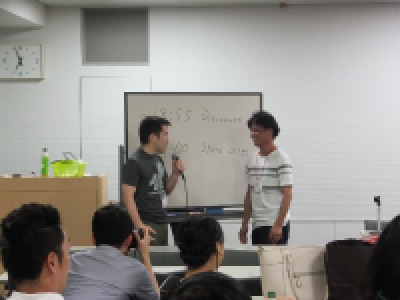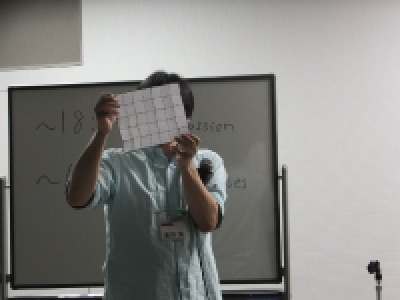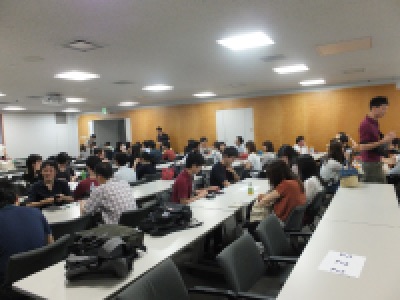1.前半マテリアルの様子

2.後半マテリアルの紹介 Mさん

3.ディスカッション中の様子

:::::::::::::::::::::::::::::::::::::::::::::::::::::::::::::::::::::::::::::::
《 今回のworkshop 》
○workshop参加人数:66名(うち新人の方:9名)
○【前半】:Learn from mistakes
○【後半】:折り鶴から羽ばたくイマジネーション
:::::::::::::::::::::::::::::::::::::::::::::::::::::::::::::::::::::::::::::::::
みなさまこんにちは、E’s club幹事のKです。
6月24日(土)開催の第152回workshopの詳細をお送りいたします。
今回は前半のマテリアルをMさん、後半のマテリアルをMさんにご作成いただきました。
前半は”Learn from mistakes”、後半は”折り鶴から羽ばたくイマジネーション”というタイトルでそれぞれディスカッションを行います。
後半のReferenceのリンク先にはTEDの動画があります。
事前にご視聴をお願いいたします。(動画の長さは15分53秒です。)
[今週のマテリアル]
≪FIRST HALF≫
Learn from mistakes
Anyone make mistakes, but the bigger they are, the less we may be willing to tell others them.
However, we human can learn from our experience.
Why don’t we share a lot of experience and lesson?
~18:55
Q1
Which is your tendency, first doing, next thinking or opposite?
(It must depend on the case, but think of your characteristics)
What are advantages on both attitude?
Q2
What was the biggest (of what you can tell) mistake in your private life?
Do you have preventive measure against it now?
Is there any better way not to make it again?
Q3
What are the mistakes, they are not so serious but you make them often in your private life?
Is there any simple, easy preventive measure against them?
Q4
What was the biggest (of what you can tell) mistake in your work/school life?
Do you have preventive measure against it now?
Is there any better way not to make it again?
Q5
What are the mistakes, they are not so serious but you make them often in your work/school life?
Is there any easier preventive measure against them?
18:55~
Share the most important or interesting case through Q2 to 5 in each table with every participant in 5 minutes.
Table numbers will be drawn by cards.
≪LATTER HALF≫
<Agenda>
折り鶴から羽ばたくイマジネーション
<Reference>
TED TALKS
Robert Lang
The math and magic of origami
Transcript
<Reference 2>
Ingestible origami robot
<Reference 3>
折り紙が織りなす未来
<Reference 4>
“Origami” から生まれる世界的な技術革新
http://www.nippon.com/ja/currents/d00161/
<Questions>
1. Most of Japanese experienced origami when they are kids. Sometimes they make cranes to foreigners. By doing origami, I often feel my Japanese cultural background. Are you aware of your nationality when you talk with a foreigner (or when you are in a foreign country)? When?
2. In the long history of origami, Akira Yoshizawa had changed a lot. After him origami world became more complex. It’s not too hard to say that he is a genius. In the history of human kind what is the biggest quantum leap (Copernican revolution) for you? (ex. using guns in the war by Nobunaga, typography by Gutenberg, heliocentric system theory by Copernicus)
3. In our future, what is the greatest innovation that you can imagine?
4. Surprisingly ,the way of folding paper (origami) has been used in completely different fields (space engineering, micro robot engineering etc.). There are a lot of techniques that now are being used for different applications. For example Cameras are applied to medical area as gastrocamera. Please give an example.
5. Can your skills (disposition, job, hobby or quotidian life) be used in a totally different way?
If you finish all the questions, make up a cube with the paper I give you. (I have already folded valley and mountain lines).
***********************************************************
私たちと一緒に英語コミュニケーション能力を鍛えませんか?
ご興味を持たれた方は、
入会申込フォーム
https://english-speaking-club.com/cms/?page_id=93
よりお申し込みください。お待ちしています!
***********************************************************